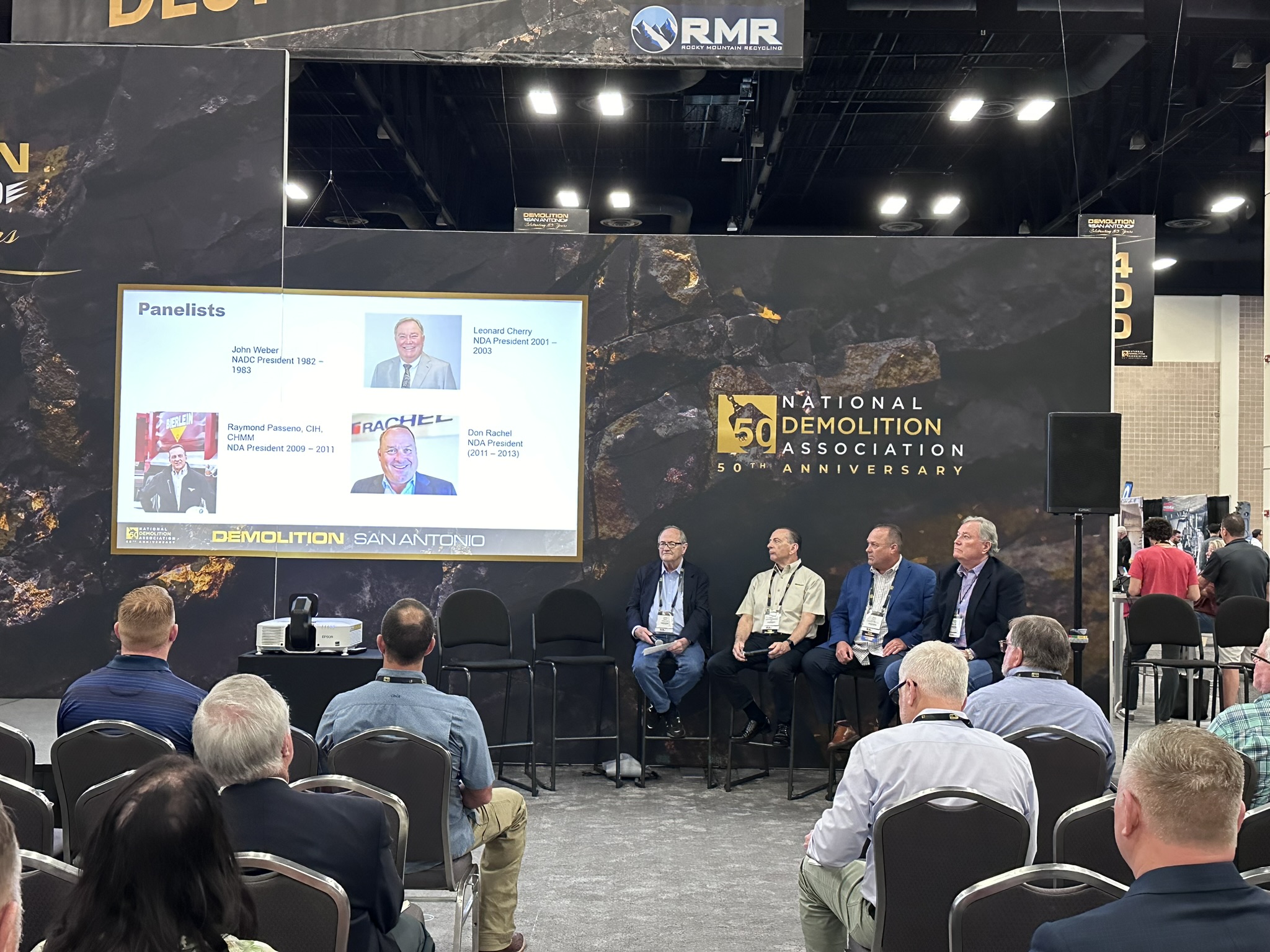Reflections From the NDA Past Presidents Panel
March 21, 2024

Attendees of the National Demolition Association’s (NDA’s) annual convention in San Antonio gathered for a special panel discussion featuring esteemed past presidents on March 8 in the exhibit hall. Demolition San Antonio marked the association’s 50th anniversary, inviting a reflection on its evolution and the visionary leadership that shaped it. Moderated by James Milburn, current NDA president, the panel delved into pivotal moments, challenges and aspirations for the future of the NDA.
A Living Legacy
Leonard Cherry, whose tenure as president spanned from 2001-2003, opened with heartfelt acknowledgment of old acquaintances and the influx of new faces. He emphasized the vitality of the association, evident in its continued growth and rejuvenation.
Uniting for Progress
Raymond Passeno, recipient of the 2024 Lifetime Achievement Award, reminisced on the collaborative efforts that transformed the association. Reflecting on his term from 2009-2011, Passeno highlighted the unity between vendors and members, a synergy that invigorated the association's core.
“We fought for the exhibit hall to be a place for people to gather and learn. There’s a better vibe, and it’s great to see. It brings more togetherness with the vendors and the members. It’s something we really wanted,” Passeno said.
Weathering Storms
John Weber, president from 1982-1983, recounted the association's early struggles with asbestos regulations. Facing citations and legal battles, NDA rallied behind its members, exemplifying resilience in the face of adversity.
“Within the first two years of our organization, we got a surprise when the Environmental Protection Agency (EPA) came up with all the asbestos regulations and started issuing citations to demolition contractors for not removing asbestos,” Weber recalled. “One of the board members, John Adamo from Detroit, was cited and came to the board and was like ‘What do we do?’ The board decided to take care of the legal fees for him to not pay the fine and claim not guilty. The first cases were lost but appealed, and the Supreme Court took on Adamo Wrecking Co. v. United States and ruled in our favor. Adamo beat the U.S. EPA.
“The government doesn’t like getting beat, but Bill Baker being the kind of guy who would rather get along than fight, started working with the government agencies for the benefit of all our members. We got an OSHA grant that allowed us to pay for the first ever demolition safety manual. It costs a lot of money to sue all the way to the Supreme Court, so we were broke after only existing for two years. At the convention like this, we passed the hat. The members contributed what they could to keep us going to the next convention in Las Vegas where we could make enough money to move forward. It was about a three-year process of legal battles.”
From Reactive to Proactive
Don Rachel, who led the association from 2011-2013, emphasized NDA's transition from reactive to proactive engagement. With a strengthened lobbying presence, the association now anticipates challenges and advocates for industry interests.
“There’s been a lot of change since this organization started,” Rachel said. “We’re out lobbying to cut things off before they happen. We’re in a better position than when we started.”
Embracing Change
As the demolition industry stands on the cusp of transformation, panelists deliberated on the association's role in navigating the next decade. Passeno stressed the importance of corporate leadership engagement, echoing sentiments of adaptability and foresight.
“It’s a lot to pull something like this off and provide members with what they need,” Passeno said. “The hallmark of an organization like this is serving the membership. If you don’t do that well, the membership goes away. We’ve always strived to show that demolition is a vital part of the construction industry. It’s a unique part that deserves its place. In the 1990s, everyone just thought we blew up buildings, and we worked so hard for so many years to professionalize this organization and to see where we’ve come is very exciting.”